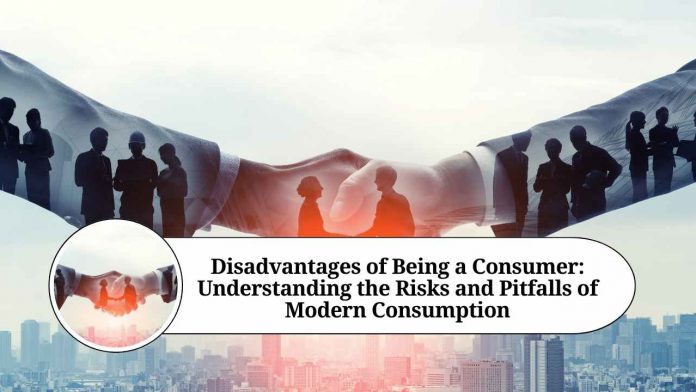Introduction of Disadvantages of Being a Cosumer
In today’s world, being a consumer is an unavoidable reality. We rely on products and services to meet our daily needs and desires, and we often feel compelled to constantly upgrade and improve our lifestyles. However, while consumption can bring many benefits, it also comes with a number of significant disadvantages that can have negative impacts on our health, finances, and overall wellbeing. In this blog, we’ll explore some of the most important disadvantages of being a consumer, and offer some tips on how to mitigate these risks.
- Financial burden: One of the most obvious disadvantages of being a consumer is the financial burden that comes with constant purchasing. Whether it’s buying the latest tech gadgets, upgrading your wardrobe, or eating out at fancy restaurants, all these things can quickly add up and leave you with a significant amount of debt. In fact, according to a recent study, the average American carries over $6,000 in credit card debt alone. This can be particularly problematic if you’re already struggling to make ends meet, or if you’re saving up for important financial goals like buying a home or starting a business.
- Health risks: Another major disadvantage of being a consumer is the potential health risks associated with certain products and services. From the use of harmful chemicals in cosmetics and cleaning products, to the health impacts of fast food and processed snacks, there are a variety of risks to be aware of when making consumption decisions. Additionally, the constant exposure to advertising and social media can also take a toll on our mental health, leading to feelings of inadequacy, anxiety, and depression.
- Environmental impact: In addition to the personal risks of consumption, there are also significant environmental impacts to consider. The production, transportation, and disposal of goods and services can contribute to climate change, air and water pollution, and resource depletion. As consumers, we have a responsibility to make sustainable choices whenever possible, and to advocate for systemic changes that prioritize environmental protection.
- Limited options: Another disadvantage of being a consumer is the limited options that are often available to us. Whether it’s a lack of affordable healthy food options in low-income neighborhoods, or the limited availability of quality healthcare services in rural areas, there are many instances where consumers are left with few choices or subpar options. This can be particularly frustrating if you’re trying to make positive changes in your life but are limited by external factors beyond your control.
In conclusion
While being a consumer is a necessary part of modern life, it’s important to understand the risks and disadvantages that come with this role. By being aware of these issues and taking steps to mitigate them, we can make more informed and responsible consumption choices, and work towards creating a more equitable, sustainable, and healthy world for all.
Frequently Asked Questions (FAQs)
Q: What is the financial burden of being a consumer?
A: The financial burden of being a consumer refers to the costs associated with constantly purchasing goods and services. This can include credit card debt, high-interest loans, and other financial obligations that can quickly add up.
Q: What are the health risks of being a consumer?
A: The health risks of being a consumer can include exposure to harmful chemicals in products like cosmetics and cleaning supplies, as well as the potential negative health effects of fast food and processed snacks. Additionally, constant exposure to advertising and social media can also contribute to mental health issues like anxiety and depression.
Q: How does consumption impact the environment?
A: Consumption can have a significant impact on the environment, including contributing to climate change, air and water pollution, and resource depletion. The production, transportation, and disposal of goods and services can all contribute to these issues.
Q: How can consumers make more sustainable choices?
A: Consumers can make more sustainable choices by prioritizing environmentally friendly products and services, supporting companies that prioritize sustainability, reducing overall consumption, and advocating for systemic changes that prioritize environmental protection.
Q: What are the limitations of being a consumer?
A: The limitations of being a consumer can include a lack of affordable healthy food options in low-income neighborhoods, limited availability of quality healthcare services in rural areas, and other factors that can limit the choices and options available to consumers.
Q: What can consumers do to mitigate the disadvantages of consumption?
A: Consumers can mitigate the disadvantages of consumption by being more mindful and intentional about their purchasing decisions, seeking out sustainable and ethical products and services, reducing overall consumption, and advocating for systemic changes that prioritize consumer protections, environmental sustainability, and social justice.



















